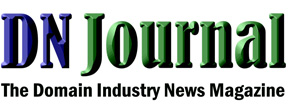|
themselves
and their businesses on the Internet. However, we
haven't had as much insight into how things are going
in the domain aftermarket where higher priced
premium domains are found. While we publish hundreds
of aftermarket sales in our weekly domain
sales report, those represent only a small
fraction of overall sales as most go unreported,
especially the largest ones that are commonly subject
to non-disclosure agreements.
|

Image
from Bigstock
|
Fortunately,
there is one group that has a clearer view
of overall aftermarket activity - top tier
domain brokers who close so many big sales
under terms that are never publicly disclosed.
Since the aftermarket is where buyers
find the great names, we expected the brokers
to see a lot of new inquiries - but at the
same time, in a plunging economy a lot of
buyers may no longer have access to the cash
they need to get the kind of domain they want.
So, to find out which of those strong
crosswinds are winning out (or if they've
created a stalemate), we connected with a
dozen veteran domain brokers with records of
success, to find out how the pandemic is
affecting their business - negatively or
positively - and how they think the
aftermarket will fare as we continue through
what has become a perilous year for so many
here in 2020. We
would recommend reading the article straight
through but if you would like to immediately
jump to the commentary |
|
from
a specific broker, clicking their name in the
links below will take you directly to them. We
very much appreciate that Andrew
Rosener (MediaOptions.com), Dave
Evanson (Sedo.com), Kate
Buckley (Buckley Media), Alan
Dunn (NameCorp), George
Hong (Guta.com), Morgan
Linton (MorganLinton.com), Bill
Sweetman (Name Ninja), Giuseppe
Graziano (GGRG.com), Joe
Uddeme (NameExperts.com), Ryan
McKegney (DomainAgents.com), Reza
Sardeha (DAN.com) and Hall of
Famer Monte Cahn
(RightOfTheDot.com) all took time out of their
busy schedules to share their thoughts with us
and DNJournal readers. |
The
first sign we saw that the aftermarket might fare
better than many expected came in a May 8 tweet I saw
posted by Andrew Rosener at MediaOptions.com
who wrote, "OK, so I know I've been all 'bah
humbug' about the market, but we just closed our
best week of the year in sales, and NOT because of
a single outlier, although there was one, there were a
number of very solid sales that CLOSED. Domain names
may have reached a tipping point." Since Andrew's
post piqued our interest in taking a deep dive into
this topic we called on him to kick off what I think
you will find to be some very interesting and
illuminating commentary on the current state of the
domain aftermarket.
Andrew
Rosener
Founder,
MediaOptions.com
At
the beginning of this year, Escrow.com presented
Andrew Rosener with their annual award given to the #1
broker in the world in terms of total domains sales
transacted on their platform. Year in and year out
Andrew has proved himself to be one of the very best
in the business. This is what he had to say:
|
I believe the
best way to look at this crisis is with a
zoomed out lens. If we zoom out beyond the
domain market to a macro perspective, I would
argue that very little has changed
systemically as a result of the virus, we have
simply expedited or exacerbated already
growing trends towards digitalization and an
increased dependence on government and central
bank intervention to bridge that transition
from a physical world to a digital
world. The relationship of these
two seemingly un-related circumstances,
digitalization & socialism, is actually quite
direct. It’s a ying and yang
situation. As the World becomes ever
more digitalized, many of the jobs that were
previously thought to be required are in reality no
longer needed. Many skills are no longer
valuable. Priorities and values change
in the marketplace and that is reflected in
the jobs and economy as value shifts away from
one and towards the other.
All that
displacement and dislocation is creating a ton
of “slack” in the economy and
financial systems. The government is
trying to “pick up the slack” by
providing some form of UBI (universal basic
income) and all sorts of alphabet soup of
fiscal and monetary intervention “programs”.
Those folks who come to depend on the
government will broadly speaking fall
into two camps: one is the folks who
simply throw in the towel and are happy to
continue to collect government support
and welfare; the other are folks who
believe in the American Dream and will roll up
their sleeves and reinvent themselves to
better serve (I use that word specifically)
the digital economy. |
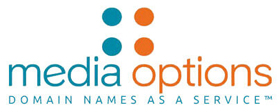

Andrew
Rosener
CEO, MediaOptions.com |
|
People
do not want to be placated. Deep
down, Americans in particular, just want to be
given the opportunity to “make
it.” They want a fair playing
field where they can put in an honest day's
work and earn a living to provide for them and
their families. Right now and likely for
the foreseeable future, the only playing field
that is open for business and offers that kind
of “American Dream” opportunity is
the digital economy. Enter domain
names.
It
is my belief that domain names represent
the underlying asset of the digital economy.
It is my hypothesis, and my underlying
investment thesis that in any asset class,
that the underlying asset of any industry or
economy will, over its expected utility life
or real lifetime, trend towards and ultimately
achieves at maturity the value of the commerce
and value built on top of that asset. In
the case of the land that makes up the Island
of Manhattan, we are only a couple of
percentage points away from the land value
being equal to the real estate value (the
bricks on top of the land) and equal to the
commerce conducted annually on the island of
Manhattan. Thus, one could say that
the Manhattan real estate market is very
near peak maturity. In the case of
the internet and digital economy, the
underlying asset, if one agrees that it is
domain names, only represent a small fraction
of 1% of the commerce conducted on top and
quite shockingly, the entire .com domain root
is only worth a small fraction of the market
cap of the top 30 “pure-play”
publicly traded internet companies (Google,
Facebook, Alibaba, etc…). With
this in mind, I would say that we are in
the very first innings of the internet and the
early innings of the domain game.
It
is hard to find an economist or investor today
who doesn’t have a thesis or prediction for “digital
assets”. If you haven’t heard,
Digital Assets are all the rage!
But aren’t domain names one of the original
digital assets? Domain names offer
greater utility than almost any other digital
asset class I can think of, so where is the
disconnect? Value education and
value transparency. Oh yeah, and
credit!!!
What
the World needs now is a new asset class to
encumber with debt. That’s how a
system inherently built for growth at any cost
works. Domain names, if we can solve the “agreed
upon objective value” problem, seem very
well positioned for this role. Just like
in 1971 when we came off the gold standard and
housing prices immediately decoupled from
average American wage and have continued to
rise ever since (due to more and more debt
encumberance) , the World is now going to
decouple from the “Physical” standard
and the value of all things digital will
continue its assent from here. We
are at an inflection point. What I’m
trying to demonstrate is that the Covid-19
virus and the subsequent crisis it has brought
to light was not CREATED by the virus, it was
only highlighted and expedited by
it.

Andrew
Rosener speaking at the 2019 NamesCon Global
conference in Las Vegas.
|
Which
brings me to the question asked, how has the
virus and crisis affected MediaOptions’ business?
January 2020 was the best month in the
history of the company. In fact nearly
tripling the next best month. If you
look at the recent Q1 report from Escrow.com,
I can tell you that around 35% - 40% of all
sales in Q1, conducted at Escrow.com,
were from MediaOptions. January was
simply breath taking. February by
contrast, was a fraction of the previous month
and March is really where things ground to a
halt. In March, I believe our sales as a company were
down by around 50% or possibly a bit more
compared to the same month 2019. Inquiries were
actually up but closed transactions were way
down. Suddenly we were selling
loads of $2,000 - $25,000 domains, mostly in
the $3k - $5k range. A market we have
never really been much of a player in. However,
the top of the market (the top 2% of domains
as we like to say), which is our |
|
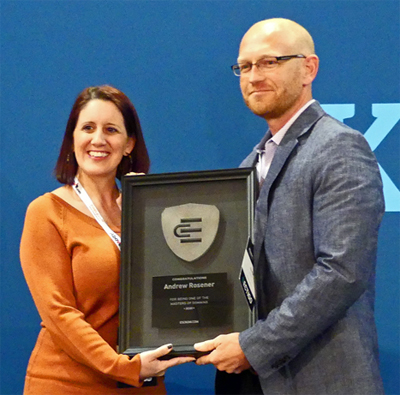
|
|
Andrew Rosener had to cancel his trip to
NamesCon Global
2020 in January but Tess Diaz (left) and Chris Zuiker were
in Austin to pick up the the
Escrow.com Award that
Andrew
and MediaOptions won for
transacting more domain business
on the Escrow platform than anyone in the world in 2019. |
|
|
bread and
butter, basically collapsed. We had
in total five transactions which were
agreed upon and in normal conditions would
have closed, but were voided or cancelled for
varying reasons but it all comes down to
uncertainty. One of those was a 7 figure
transaction signed and in Escrow with a large
public company, but they claimed “Force
Majeure” and basically said “sue
us”. I bet they don’t exist 5 years
from now… Uncertainty is the
greatest of all evil because it creates
paralysis. The devil you know is better
than the devil you don’t because at least
you can plan accordingly. April saw a
marked increase in transactions but the
overall sales number from a total dollars
standpoint was still quite suppressed
compared to 2019, but there was a clear trend
back towards momentum in the market.
|
We
are now in May (I write this on May 12th)
and as many of your readers already know based
on the engagement from my Twitter post,
Media
Options just closed its best single week of
the year. The first week of May saw us
close three 7-figure transactions and a slew
of 6 and 5-figure transactions. Although
the total dollars may be a bit less than the
best week in January, the commissions earned
and gross profit from domain sales was the
greatest of 2020. I will be the
first to say that I did NOT expect this.
I have been very public about my bearish
view on the market until recently, both on
DomainSherpa as well as on my personal
Twitter feed. Keep in mind that I was
one of, if not the first in the domain
industry to recognize the threat posed by this
virus and even cancelled my trip to NamesCon
back on January 18th already, where I
was meant to speak on four panels. Since
that time, we have been taking aggressive
action to tighten up the ship, cut costs,
focus resources & ensure the
sustainability and viability of our business.
Not the type of stuff that typically
leads to outsized growth and returns!
However, the demand is there. So I
decided to investigate to better understand
what is driving this demand and why have
domain names seemingly remained
“essential” status during a crisis where
almost EVERYTHING (except the S&P
500) is on the chopping block?
It
may be too early to tell, but I think it is a
fair assumption to say that the smart money
and the smart business managers (who are
either already digital or had execution plans
in place before the virus struck) are seeing
what’s coming and realizing that in a world
of increased censorship, zero or low
volume foot traffic to physical retail, de-platforming,
social unrest & awkwardness and broken
supply chains that will be completely reshaped
over the next decade, a powerful brand match
.com domain name is the best chance any
business has of carving out a piece of
the digital economy and building a sustainable
consumer base with commercial potential that
is not inhibited by government forced
closures or subject to changing social
attitudes and local economic conditions.
Talent is global. The internet
is global. Commerce is global.
Business inputs and resources are
global. Where they all meet is on a
domain name. Now more so than
ever! Trust me, remember, I’m
the one that sold Zoom.com
to Zoom.us so
they could move away from their US Centric
business and provide an attractive offering to
a GLOBAL audience. Just in time I might
add…
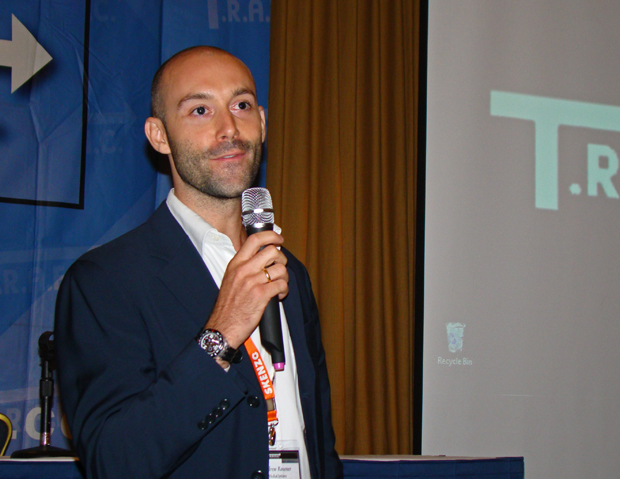
Winding
the clock back 10 years - Andrew Rosener
speaking
at the 2010 T.R.A.F.F.I.C. Vancouver
conference in Canada.
The
domain name aftermarket has remained very
strong throughout this crisis thus far. There
is a sense of poor liquidity if you are a
seller, but that is likely because most
domain sellers are trying to sell domains that
have no liquid value; but as a buyer, it
seems almost impossible to find good deals.
The best domain names left in the
aftermarket are, generally speaking, now held
by “strong hands”. These
folks, including ourselves, create a backstop
on the market. If we won’t let the
names go at a discount, then it is clear that
consensus remains that values will go up.
That the digital economy will continue
to eat the physical. Expired names are
selling at all time highs, pricing out
even aggressive buyers like myself.
This seems to be the new normal. If
you look back to my predictions even two and
three years ago you’ll see that this trend
was underway already. The virus probably
compacted 5 years of growth and market
maturity into a few months. The
aftermarket margins will continue to be
compressed as the domain market matures and
the “profile” of a wholesale buyer /
investor will contrast less and less with
that of the end user. If you think
about the residential real estate market this
is already the case. The margin for a “flipper”
in the housing market is razor thin these
days. What is needed to bridge the gap
in domain names between where we are and where
we are going as an asset class is just credit
and price discovery. This is coming in
several forms, but that is a discussion for
another day and article!
While
I remain extremely cautious about the months
ahead and I would encourage everyone to
bolster their cash positions, savings, rainy
day funds and take extreme cost cutting
measures both in their personal lives and
businesses, I am cautiously optimistic about
the road ahead for domain names, especially
good and great .com domain names, perhaps
.org too. One thing I am certain of, is
that the digital economy will continue to
rely on domain names for the foreseeable
future and the digital economy is the ONLY
ECONOMY in the World that will
demonstrate real growth in the coming few
years.
|
|

Image
from Bigstock
|
Value is like energy in that it
you can not create more or destroy it to make
less, it only shifts. Gross “value”
in the World just shifts from asset class to
asset class based mostly on exogenous
circumstances like central bank interest
rates, money supply, trade imbalances,
innovation & priorities to name a few.
Those shifts in value have far less to
do with the inherent value of the particular asset
class than on the external factors I mentioned
before. Just look at the S&P 500 as
mentioned earlier! We have around 25%
unemployment in the USA and yet the S&P
500 is just about kissing all time highs!
One might call this insane and they
wouldn’t be wrong. |
|
But if you zoom out
further you see that most things in the World
today are no longer valued nominally, they are
relative. Relatively speaking,
over
the next 10 years it is very clear to me that
the US will become even more dominant
economically relative to the rest of the
World, the $USD will become stronger and more
desirable relative to the rest of the central
bank currencies and US business, financial
markets & innovation will far outpace
relative to the rest of the World. Therefore,
anyone who would share my view could
express that financially by betting on US
business and especially US tech, broadly
represented by the S&P 500. Far less
to do with the nominal earnings of the companies
contained in that index and far more related
to central bank intervention (and expected
future intervention), economic trends and
geo-political circumstances. Relatively
speaking, one might say the S&P 500 looks
cheap! |
To be clear,
I fully expect a
major correction from here and massive
dislocation in financial markets over the
coming 12 months. But do not be
surprised to see a complete decoupling, even
further than we already have, of Main Street
and Wall Street. Even more so when it
comes to the digital economy vs. the “main
street” physical economy. As
further dislocation happens in the commercial
real estate market in particular, I
believe a lot of that value will shift into
internet real estate and the companies built
on top. We have hit a tipping
point and perhaps the first week of May
was a signal or a sign of the growth in the
domain market to come. Or maybe these
are just the death throws of a terminally ill
global economy and financial system?
You decide… |
Dave
Evanson
Senior
Broker, Sedo.com
For
the past decade Sedo Senior Broker Dave Evanson has made
so many appearances at the top of our weekly
Top 20 Sales Chart that we long ago lost
count. In the past 30 days alone he was back in the #1
spot twice with ElectricCar.com ($180,000) and
Plains.com $115,000). Dave had this to say:
|


Dave
Evanson
Senior Domain Broker, Sedo.com |
The
digital world is demonstrating strength during
the global Covid-19 pandemic and resulting
severe economic crisis. Just about all
things digital are seeing growth with the domain
space benefiting as well. At Sedo, two
weeks ago was our second most successful sales
week since 2018. For the remainder of 2020
I see the domain aftermarket continuing to trend
higher with more buyers making more offers and
more sales deals getting done. Prices will
hold relatively steady. Domain auctions
will have good results. Parking business
will stay strong.
The
world has been moving towards digital for years.
Covid-19 is proving to be a catalyst in that
direction. Consumers, who drive between
65-70% of the economy in the USA for instance,
are changing the way they behave and buy.
To predict the types (i.e., industries,
verticals, categories, etc.) of domains that
will be in greater demand we need to try
identifying and understanding these changing
behaviors. Most people are staying at home and
have more time to be online. They are
finding new ways to learn, work, connect with
people, self-entertain, procure goods and
services, and maintain or improve wellness. They
are buying more online and less at retail
locations. They are spending more on
takeout foods and on companies that deliver.
They spend more on groceries, home entertainment
(i.e., social media, news, chats, online
fitness, video and digital content, etc.),
personal-care items and necessities for the
home. |
|
At
the time this article is published stay at home
advisories and mandates are being relaxed.
Some people are beginning to go to back to work.
However, the assumption I am making,
unfortunately, is that there will be another
round or two of virus spread this year thus
causing governments to again push stay at home
orders. This will in turn put continued
pressure on the economy but the digital world
and specifically domain aftermarket will stay
relatively strong. |
Kate
Buckley
Founder
& CEO, Buckley
Media
Like
Dave Evanson, Kate Buckley is no stranger to the upper
reaches of the domain sales charts, having closed many
of the biggest sales we've seen in recent years,
including Sleeping.com and Snoring.com - at more than
$500,000 each, Inspection.com at $335,000 and
Advance.com at $300,000 to name just a few. Kate also
has a great personal life story that we recounted in a
June 2018 Cover
Story.
|
While
a number of prominent voices in the domain
industry have been impersonating Chicken
Little, I’ve taken a contrarian view. First,
I believe that out of chaos comes
opportunity.
Also, coming from a family of serious
real-estate investors, I know firsthand the
staying power of prime real estate—including
virtual prime real estate (i.e. premium .COMs).
Especially at a time when the entire world is
migrating all aspects of their lives online.
Granted,
when the news first hit and the market took a
dive, I had multiple six-figure offers
disappear overnight. But then, the market
began to recover and the reality of “the new
normal” set in. As more and more businesses
were forced to move all consumer touch points
online, having a strong and trustworthy domain
name became more important than ever. Not only
that, but startups are on the rise, all of
which need a domain name—here in California,
the Secretary of State is processing new
corporations faster than pre-Covid-19.
I’m
seeing a renewed—and impassioned—interest
in short, descriptive .COMs, and our inbound
inquiries at Defining.com have gone through
the roof. When I explain that there’s no
better virtual real estate than a strong .COM
with high consumer resonance and trust (and
what all that means strategically to the
company in question), CXOs sit up and listen.
Companies need the competitive advantage of a
premium domain now more than ever. We are in
talks with multiple end users right now
discussing JVs, financed deals (payment plans)
and cash deals—all in the six - seven figure
range. |


Kate
Buckley
Founder & CEO
Buckley Media
|
|
We’re
also seeing increased demand on the buy
side, and have seen domain acquisition
requests pick up substantially over the past
month. In fact, I just successfully got one
closing over at Escrow.com today.
While
no one has a crystal ball—to quote John
Kenneth Galbraith, “The function of economic
forecasting is to make astrology look
respectable”—I think it’s fair to say
that we’re seeing a massive shift to a new
reality—one that requires companies to pivot
and become digital businesses, and moreover,
to own their interface and data. As with
physical real estate, location is everything,
and companies increasingly understand that
it’s mission-critical to operate on the best
digital address possible.
Whether
you’re a large bluechip company seeking new
inroads to your customers or a D2C startup, a
consumer-facing, descriptive .COM domain can
make all the difference. Take the case of snacks.com:
"Sometimes,
an idea comes along that makes you think, how
did this not exist before? That’s what we
thought when we heard about snacks.com,
Frito-Lay’s new snack-slinging site. As
domain names go, snacks.com is an all-timer.
Turns out, the company’s been sitting on it
for 20+ years, and spun up the new site in 30
— The Hustle
Moreover,
Adweek pointed out that this allowed PepsiCo
(parent company of Frito-Lay) to become the
gatekeeper of their own brand—owning both
the channel and the data:
"Monday's
launch of two direct-to-consumer sites, PantryShop.com and Snacks.com,
represented PepsiCo's [parent company of
Frito-Lay] first move into the DTC space. But
the tactic isn't just about revenue—it's
also about gathering clear consumer data. '[I]f
you own the interface, you own the customer,'
said Wunderman Thompson Commerce's Hugh
Fletcher. 'If you own the customer, you own
the data, and if you own the data, you own the
future.’
“While
PepsiCo has no shortage of consumer insights
from market research firms and retail
partners, PantryShop.com and Snacks.com will
provide information that can’t be found
elsewhere, and through a channel owned by
PepsiCo.”
This
is the power of a short, one-word .COM that
also happens to be category-defining—a smart
investment for the modern age (stable and
relatively liquid, with virtually no carrying
costs, able to be deployed at any moment; an
appreciating asset that lowers the cost of
customer acquisition). Quality premium domains
are lead generators, brand
enhancers, and
appreciating assets. All three lead to greater
ROI and higher company valuations. It’s
virtually impossible to find ALL three
qualities in any other asset. While I cannot
comment on the prospects of the domain market
overall, I remain bullish on the future of
premium domains. |
Alan
Dunn
Managing
Director, NameCorp
In
addition to being one of the most highly regarded
brokers in the industry, Alan Dunn is one of the most
highly regarded human beings - living proof that nice
guys finish first - not last! Alan also has an amazing
life story that we told in our February 2017 Cover
Story.
|


Alan
Dunn
Managing Director
NameCorp |
2020
has been like a science fiction movie so far.
And like many movies, I think the new world is
fairly predictable at this point. While the
financial fallout and human toll has been
devastating around the world, economies have to
move forward. This next period will be rough for
many but in order to survive, most all companies
(and people) have to change. Not only
economically but also culturally.
These change will not be easy for everyone. For
some, this change will simply be an accelerated
piece of an already planned puzzle. For others,
it’s like learning how to swim. Remote
learning, working from home, social distancing.
Not to mention the lack of human interaction,
loss of entertainment venues and more.
Personal and Professional well-being of
employees is now a mandatory responsibility for
almost every employer.
With respect to domain names, I think this “new
normal” is a critical call to get online for
both company and personal survival.
My
prediction is more demand will flow to super
premium domain names and smaller buy it now
priced inventory. However, secondary and
defensive acquisitions will drastically reduce
as companies look to conserve cash, and
ultimately realize most of those are just
playing whack-a-mole in a never ending journey
anyway. |
|
Personally,
I see COVID as the biggest reset in our lifetime
both personally and professionally (Thank you
James Booth for that perspective many months
ago) and it’s one we must all adapt, and
hopefully, find the positive in.
Domain names should survive even the worst of
times, and for many of us, business should stay
the course with its usual roller coaster
moments. I think we are all lucky to be part of
an industry which is already fully online. For
that alone, we should all be thankful.
On a side note, between Michael Cyger’s happy
hours, personal virtual Zoom birthday calls
(public apology for missing V’s) and social
media, I think we have also seen how great a
community domaining really is. I’ve always
said we are one big dysfunctional family but I
think CVOID has made us a lot more like family
and a little less dysfunctional. Only time will
tell if that will last )
|
George
Hong
Founder
& CEO, Guta.com
George
Hong is a native of China who who maintains
homes and offices in both the U.S and his
homeland. With his bilingual skills and close contacts
with key buyers and investors on both sides of the
Pacific, George's company, Guta.com
has become one of the world's busiest international
domain brokerages.
|
Guta
is focusing on premium domain brokerage
business. Based on our own sales data and our
latest quarterly
Premium Domain Sales Observation Report,
It is evident that the global Covid-19
pandemic has had a severe impact on the sales
of a wide range of premium domain names
tracked in the above report.
Take short numeric domains as an example:
We began 2020 with a few strong sales in early
January. I thought we were on pace for a
record-breaking year. The spread of
coronavirus stopped the momentum in late
January.
The demand from end-users for short numeric
domains virtually disappeared in a short
period. I expect the need to remain low
throughout the first half of 2020. Things
should improve after the main sports events
come back later this year.
Businesses
adapt to the pandemic by moving online.
Overall there will be more businesses looking
to register, buy, or upgrade domain names. Many businesses shift luxury spending to
necessity spending to deal with cash crunch
issues. I don't expect to see a lot of 7/8
figure sales for the remainder of 2020, and I
anticipate that we will see a lot of new
domain registrations and aftermarket
transactions of relatively lower-priced
domains. I wouldn't rule out that a few companies, who
understand the value and power of premium
domain names, would spend seven figures or
more on domain purchases. They would take
advantage of
the current market situation to buy domain
names that are worth 5, 10, or even 100 times
over the purchase cost to their business. For
them, this kind of high price purchase is
also essential for their business. |
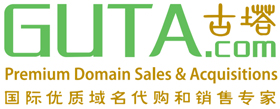

George
Hong
Founder & CEO
Guta.com |
|
I am optimistic about the long-term future of
premium domains but concerned about some
challenges that might occur in the near-term.
Yes, Online business will weather the storm
much better than offline companies such as the
beloved Cirque du Soleil, who lost 100 percent
of their revenue. We will have our share of
obstacles to overcome, though.
As said by Winston Churchill, never waste a
good crisis. Some long time customers recently
engaged us. They are making fair investor
offers via us to buy selected high-quality
domains. They are greedy when others are
fearful. Over the past months, central banks
around the world have started printing money
on a large scale to deal with the pandemic.
Over time, all paper currencies will lose
value. Buying premium domain names would be a
pretty decent choice for long-term investors
who want to put extra money in relatively safe
investments that hold their value.
|
Morgan
Linton
Founder,
MorganLinton.com
Over
the past decade, multi-talented Morgan Linton made a
name for himself as an domain investor, developer,
blogger and co-founder of a thriving start-up in BoldMetrics.com.
In his many travels around the globe has made countless
new friends with his outgoing personality and positive
outlook on both business and life.
|
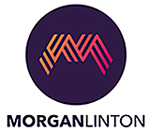

Morgan
Linton
Founder, MorganLinton.com
|
I
think that there are a number of different ways
that COVID-19 has already impacted the domain
name world, and other ways it likely will as the
rest of the year unfolds. Given that most of my
focus is on selling domains to startups and
helping startups acquire domain names I see it
from this perspective, which might be different
from someone who focuses on Fortune 500
companies or on the flip side, traditional small
businesses.
While
there were some early concerns that venture
funding would decrease, it has remained steady
as some sectors like Cloud, Social, and Delivery
are thriving. When startups get fresh funding,
they often look to upgrade their domain name,
this has continued through the COVID-19 pandemic
and I've actually seen it increase as startups
rush to capture market share - they definitely
know what a critical piece of the puzzle a
domain name is. Additionally, entrepreneurs
are thinking of new ideas and launching
companies faster than ever before as they look
to innovate and impact the world as it rapidly
changes. For these companies, they are looking
for their first domain and budgets are still
very meaningful with many startups comfortable
paying $15,000+ for their first domain.
Another
trend I've seen that's only accelerating now is
strong interest in context-specific TLDs like
.IO and .AI. Rewind five years ago and most
startups were laser-focused on getting their
.COM, now I'm seeing more and more, especially
in the AI or dev-focused sectors prefer TLDs
like .AI or .IO when they're getting started
because it gives people an idea of what they're
doing. For me this has meant being a part of
smaller deals |
|
since
non .COMs tend to sell in
a lower price range, but at the same time I'm
seeing a much higher volume of deals and
inquiries in non .COMs so in many ways it's
balancing out.
|
|
As
for what happens as we move into the second half
of 2020, I think we'll continue to see strong
interest from startups but, as I mentioned
above, a bias towards domains in markets like
Cloud and Social where companies are seeing
growth. Additionally, everyone is more
budget-conscious now than ever so I do think a
focus on price points in the sub-$50k range will
continue. Just to be clear, this doesn't mean
startups aren't buying domains in the six-figure
range, but I think the volume is now in the $10k
- $40k range. From what I can tell, domain names
are more relevant than ever before and it looks
like they are an asset class that is weathering
the storm better than most. Still, as we all
know, things can change quickly so I'm keeping
my eye on how things are changing and am ready
to adapt as they do. |
Bill
Sweetman
President
& Lead Ninja, Name
Ninja Bill
Sweetman has been an internet professional
for well over 20 years with experience in just about all
aspects of the industry, including everything from
handling high end sales to moderating most of the
featured sessions at the annual NamesCon Global
conference. Bill brokered one of 2019's biggest domain
sales - Carrot.com at $565,000.
|
When it comes to my domain buyer brokerage business,
Name Ninja, I
confess to being a bit of a prepper. I have
been on high alert since February in terms of
making sure my business was prepared to
weather a potential downturn in business. To
my pleasant surprise -- and knock on wood --
we haven't seen much evidence of a downturn in
our business. In fact, we've had our second
best year so far since I launched Name Ninja
in 2013. Prior to mid-April, we did have a
handful of clients pause or cancel some domain
acquisition projects, but ever since then
we've seen the momentum pick up, we are still
busy, and we still have clients willing and
able to pay five- and six-figures for top rung
domain names. I'm not taking any of this good
fortune for granted, and I remain on high
alert. I am also very thankful that clients
are still coming to Name Ninja for help
acquiring domain names.
As for domain sales for the rest of 2020, I
anticipate there will be an uptick in
transaction volume but not necessarily the
dollar amount. I see two competing forces at
play here. On the one hand, I see some
end-user domain owners (from startups to
Fortune 500 companies hammered by COVID-19,
for example) who are going out of business,
sadly, and liquidating (or even just dropping)
their valuable premium domain names. This is a
great time to be buying expired domains, but
the reason for that is heartbreaking. So in
some cases it's a buyer's market for the first
time in many years. On the other hand, I
expect we will see significant pent-up demand
by end-user buyers |


Bill
Sweetman
President & Lead Ninja
Name
Ninja |
|
in Q3 and especially Q4; some of the
companies who put their plans on
hold in Q1 and Q2 may come roaring back into
the market looking to resume the purchase of
their dream domain, only to find that it's
already been sold or there are now more buyers
competing for the same domain. I've been
encouraging my clients to move as fast as
possible now to lock down purchase deals
because I think it's going to be a very
competitive market for ultra-premium domains
(one-word .com domains) later this year and in
2021. |
Giuseppe
Graziano
CEO
& Founder, LXME - Lisbon Media (GGRG.com) Giuseppe
Graziano has had a meteoric rise since bursting upon the
domain scene in 2014. He is based in Lisbon, Portugal
but, with the ability to speak five languages, stays
busy serving clients worldwide. His company published a
popular quarterly
report on Liquid Domain Sales and he also
recently started a new series of interviews with domain
industry leaders that are published on the GGRG
blog.
|
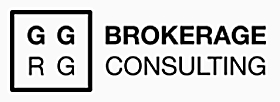

Giuseppe
Graziano
CEO & Founder, GGRG.com |
Assuming
that within the domain aftermarket there are 2
separate markets (investors and end users), and
assuming that the investor's demand is a
function of the income investors receive - with
the major variable component of that revenue
being, ceteris paribus, End Users sales - I see
the following happening for the remainder of
2020:
-
In the End
User's market, established companies who
have not done so already, are being forced
to go online. If you are a major company and
you are not under financial stress, this is
the time to go ahead and finally upgrade
your domain. Companies having unexpected
surge in demand are more willing to spend on
domains. Sectors that are benefiting the
most are E-commerce, Online Gaming, Online
Media, Health Care, Crypto, Online
Education, etc. At the same time, many
companies are killing most new projects due
to market uncertainty and/or allocating only
a small budget for the domain. These effects
should balance themselves out.
-
In the
Investor's market, as in any crisis, many
investors will need to liquidate assets,
both because they might be in need of cash
or to take advantage of the buying
opportunities in other markets. This
naturally results in increased supply and
downward pressure on prices. We are seeing
this dynamic in place on LMX.com where
traders are listing more domains for sale at
reasonable prices.
|
-
While I expect
low value domains going down in value even
further due to increased supply, the most
valuable domains (2/3 letter .com, 2/3
number .com, One Word .com, etc) will see a
return to "price polarization"
where the wholesale prices will go down,
while the end user's price points may be
stable or even go up. For the buyers,
these domains will be the most interesting
opportunities.
|
Joe
Uddeme
Principal,
NameExperts.com
|
After
five years as the Director of Business
Development for DomainHoldings, Joe Uddeme left
in 201to start his own shop at
NameExperts.com and he has a very
successful run since then with a number of
high profile charted sales. Joe had this
to say:
Covid-19
brought an abrupt change to the domain name
aftermarket. Most new domain name starts were
placed into a holding pattern for many
Companies, while some of the older, legacy
deals were canceled altogether. The market has
since stabilized with domain name starts
tending to trend in the right direction.
Aftermarket domains will continue to grow in
the coming months, as new business transition
online in the new-normal that we are facing as
a society.
There
are many categories that will grow immensely
over the coming months including; Health,
Food, Infrastructure (US), Bio Sciences, AI,
and many other categories. The Travel and
Airline space are going to be in trouble—for
a long time. That will ultimately affect
traditional real estate, restaurants,
hospitality and Energy.
Looking
forward, Business will continue to evolve and
the market will also continue to evolve.
Online presence
will vastly scale across the globe as more
people understand that a digital society will
dominate the landscape—at least until we
have a vaccine for global disbursement. |
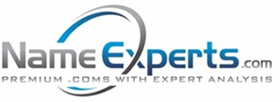

Joe
Uddeme
Principal, NameExperts.com |
Ryan
McKegney
CEO, DomainAgents.com
|


Ryan
McKegney
CEO, DomainAgents.com |
DomainAgents.com
has been making waves ever since the company was
founded by Ryan's brother Phil McKegney and Adam Strong in
2012. The last three years in a row
DomainAgents won awards presented by Escrow.com
as one of the top ten brokerages in total sales
volume worldwide on the Escrow.com platform.
Ryan had this observation:
It's
very difficult to predict what will happen in
the next few months and like most businesses,
we've been taking it week-by-week. We have
seen a 20% increase in the number of
inquiries we've received since the pandemic hit
North America two months ago. There has been a
rush to get businesses online and many
people are being forced to look for new
opportunities. This has been good for
domain sales and registrations. The pandemic has
accelerated trends towards remote work and
online business, but mass unemployment and
economic disruption may create long lasting drag
on domain prices. Domains should weather
the storm, but I'm still expecting a bumpy
ride.
|
Reza
Sardeha
CEO,
DAN.com
|
The
innovative Amsterdam based Domain Automation
Network, known to all as DAN.com,
makes a change of control and ownership of
digital brands easier, safer and instant. The
use of blockchain technology automates
processes required to provide trust-less
domain ownership transfers. Domain automation
also makes it possible to introduce new domain
purchase and use models like renting domains,
lease to own, fractional domain ownership and
domain exchange in a scalable and frictionless
way. Reza said this:
We're
seeing that at the beginning of the pandemic,
that the sales volume increased on the
lower end of the market while we observed
fewer outlier sales.
In
the past two months, we're observing that
the total value spent on domains has increased
again and is at the same level as before the
pandemic. If we look at other industries
that are intertwined with ours (the DIY
website maker industry for example) we observe
a huge increase in demand which we
expect will impact the domain industry
positively but somewhat delayed.
Having
said the above, many variables can still
disrupt the positive outlook that we're
observing at the moment. We simply do not know
what the full impact of the pandemic on
the |


Reza
Sardeha
CEO, DAN.com |
|
mid-long
term will be for our industry. We, therefore,
advise domain investors to keep a close eye
on their cash-flow management and to
create a conservative buffer for their
operation. We also advise our sellers to
continue investing in domains but with
moderation as there are some uncertainties
ahead which are unpredictable. |
Monte
Cahn
President
& Co-Founder, RightOfTheDot.com To
wrap up this report we wanted a heavy hitter from the
domain brokerage and sales side of the business who has
been through every up and down this industry has
seen over the past 25 years. Nobody fits that bill
better that domain pioneer Monte Cahn who has been
making six and seven sales since the 1990s as one of the
original architects of the domain aftermarket itself. In
any discussion involving premium domain sales,
Monte is undoubtedly the guy who deserves the last
word.
|
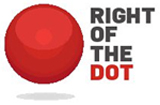

Monte
Cahn
President & Co-Founder
RightOfTheDot.com
|
I
have been through 2 major
market downturns since starting in the domain
industry in 1994/95. Although this
episode is and will be much different than the
2000/01 (Dot-com bubble followed by
9/11) and
2008/09 (United States Housing Bubble) market
downturns, the one constant is that online
digital / virtual real-estate assets / domain
names and most web related properties will
continue to carry sustainable value for the most part.
For
Reference and some background, there were only
about 625-700 active websites in 1993/94, most
of which were websites about the internet and
resources for and about the World Wide Web.
I have been involved in more than $550
million in domain sales transactions of all types
since 1996 through today while starting and
running companies such as HitDomains /
DomainSystems, Moniker, SnapNames,
DomainSponsor, and RightOfTheDot, so I have
seen a lot over the past 25+ years in this
industry.
In
1999, right after I brokered two record
breaking domain names with
the sale of Wallstreet.com
for $1.1 million and then Autos.com
to IdeaLabs / CarsDirect in December, 1999 for
$2.2 million, we saw a huge upswing in domain
related asset values followed by a huge
negative hit starting in mid 2000. For those
of you around at that time, those two sales
helped legitimize the domain industry by
testing the virtual asset value of something
based on the future. But when the
Dot-Com Bubble crash hit in 2000/01, many
questioned the internet as a viable and
legitimate business going forward. This
was due to many of the web and internet based
companies being overvalued on the stock market
and others raising tons of investment and VC
funding based on those overvalued companies.
|
|
Ironically, company concepts that failed
back then, are alive and thriving today.
Companies like Napster (free music and
file sharing), Boo.com
(branded fashion apparel), Pets.com
(pet supplies), Kozmo.com
(online store and delivery service), Flooz.com
(a digital currency unique to internet merchants),
WebVan.com
(grocery and food delivery), Netscape (web
browser, Internet service provider and web
portal) TheGlobe.com
(social networking), eToys.com,
etc. came and went but ecommerce ad the web
went on to win the war. Google just launched a year prior,
Yahoo launched as a web service provider
before becoming a search engine (BTW Archie
was the first search engine established in
1990), hardly any web based advertising
existed (AT&T ran the first banner Ad in
1994), internet speeds and access was phone
line based, low quality, slow speed, and
interruptions were common every day reality.
We used CompuServe, Prodigy,
AltaVista,
GeoCities, and Ask Jeeves to navigate the Web.
Doing business online back then was
challenging and more of a concept and a dream
than a tested reality. However, it was
during those challenging times that the domain
industry and domain sales kept me and my
company in business. Selling domain
assets for those in need to those that wanted,
were the key to surviving the downturn. And
even more, that period re-tested the
domain industry and our ability to make
markets from domain names in good times and in
bad. Oh and BTW, there were now over
17 million websites in 2000!
Boy
how things have changed since then! Online
access and business in general became more
reliable and prevalent. Thanks to the
adult industry, we were able to use credit
cards online and create secured socket layered
(SSL) connections, website development became
a bit easier as more web hosting and design
companies sprung up and connections went from
the phone line to hardline, satellite and
cable, usability and reliability were greatly
improved. Then came online legitimization with
companies like Yahoo and Google gaining
popularity, AOL, Pandora, Ebay,
Facebook, CarsDirect, CraigsList,
Wikipedia, MySpace,
and others. We were on a launch pad into the
future which became the present reality of
true online activity. This solidified
the web, internet and use of domain names were
here to stay. So when the next recession
/ downturn hit in 2008 / 09 and there were
already 238,027,855 websites. The
recession was unrelated to the overvaluation
of companies but rather due to over subscribed
mortgages, I knew we would rely on domain
values and sales to get through this one as
well. Some of our biggest most
successful brokerage sales and auctions (both
live and online), occurred during the
2007-2010 period.
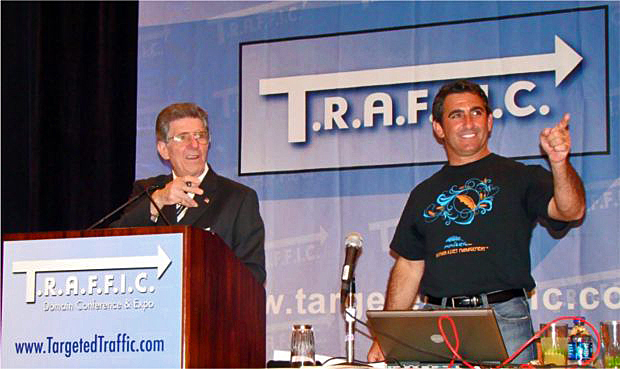
Monte
Cahn (right) and auctioneer Joel Langbaum
running the live domain auction
at the 2008 T.R.A.F.F.I.C. Orlando conference
in Florida.
I
think a look back at the past is important
because of what was different then to now.
Most people were commuting to work everywhere.
Waiting in traffic, working in offices
with others, traveling through domestic and
international train stations and airports,
live meetings, conferences, shows, etc. The
concept of working from home was a small
fraction of commerce then but now look at
where we are. This pandemic has and will
change the way we operate going forward for
everyone. Technology has enabled us to
pave the way for the new normal and
established a solid foundation to work from
home, to do business of all types through
virtual meeting, communication and touch
points, even in industries where no one could
predict, like health and medicine. I
truly believe that this pandemic will put the
internet and the way we conduct our social and
online business on a whole new and better
foundation and exciting frontier going forward. That is not to say that domain
sales and prices will not be negatively
affected for a period of 12-24 months, they
will be. This is due to pure economics
and the financial health of the world economy.
However, again domains will hold
sustainable and substantial values as more and
more people, small, medium and even large
businesses will be doing more business and
interactions online than ever before.
Even
in these stressful times, I have sold more
than $700,000 in domain names in the last 30 days
and several million since the live and online
auctions at NamesCon Global in January. This
will continue as companies look for new names,
platforms and brands to launch the new wave of
online commerce from. So I am looking at
the glass as half full rather than half empty
as I always have and I believe that everyone
in the industry needs to do the same. Price
flexibility / reductions and taking some money
off the table should be the new norm rather
than holding out for the top retail price, as
you may be holding on too long and be stuck
when it's too late. Plus, fluidity and
liquidity are nothing but good in our
Industry especially in times like these!
Fluidity and liquidity validates our
market and industry even more than before and
sets a new stronger foundation for the future
challenges and opportunities ahead.
Oh
BTW, Today there are about 2
billion websites with about 400
million of those as active sites! |
|
